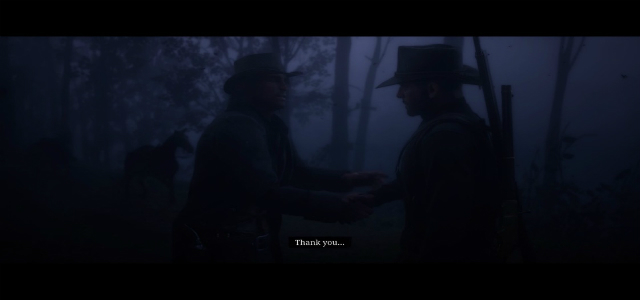Warning: This reflection contains spoilers for the game Red Dead Redemption 2. If you have not finished it and want to do so for yourself, finish reading here and bookmark the article for later.
I was late to the party in finishing Red Dead Redemption 2. The game (which Insights reviewed here) is one that was greatly anticipated and well received among release. Epic in its scope and uncompromising in its storytelling, it also takes a long time to finish properly. It is a game whose story and themes have depth worth exploring.
Loaded with side-quests that usually involve helping people stranded in its brutal, old west setting and with a central story that deliberately takes its time, Red Dead Redemption 2 could easily contain 80 hours’ worth of content.
As well as work commitments and a holiday in Japan, Red Dead Redemption 2 had to take a backseat to the usual responsibilities adults encounter. And so I ended up finishing the game, finally, on Easter Monday. The timing of this, coinciding with such an important time on the church’s liturgical calendar, added an additional layer to the experience.
Red Dead Redemption 2 is a prequel to Red Dead Redemption. The first title was the story about John Marsten’s quest for redemption in the face of his outlaw past. The prequel (with its strange numbering) sets the scene and focuses on Arthur Morgan, another outlaw who struggles with being a better person.
Apart from the fact that Arthur does not feature in the next game’s events, it becomes clear late in Red Dead Redemption 2’s second act that he is not long for the world. After an encounter on a ranch, Arthur contracts tuberculosis, a death sentence in the game’s world.
In addition to this, time starts closing in for the gang
that Arthur runs with. A motley group of criminals on the run from the law and Pinkerton
agents, the leader and father figure Dutch clearly has lost touch with reality
and cannot come up with a plan to get the gang out of trouble. Reverting back
to the only tactic he really knows, namely: rob somewhere to get money then
create chaos to confuse the enemy in the hopes of eventually getting away to
Tahiti, Dutch lacks any real strategy. It becomes clearer as the game’s narrative
moves on that the gang will not be making it out.
With his days numbered, and many bad deeds in his past yet to be atoned for,
Arthur decides his only real hope lies in getting John Marston and his family
to safety. Recognising that they have a future ahead of them, he works to get
them away from the splintering gang. Betrayed by Micah Bell, who has been
working as an informant to the Pinkertons, he lays his life on the line to get
John to safety.
In an emotional scene from the back of Arthur’s horse, the player
sees the many times he has been called “a good man” for having helped other
people. While he has had a kind of redemption, Arthur cannot ultimately escape
the consequences of his past actions.
As John and Arthur try to escape the Pinkertons, their horses are gunned down.
As Arthur’s horse lies dying, he tries to soothe the animal and thanks it for its
service to him. The scene has all the more poignancy because of the bond
between the horse and owner that the game takes time to establish. Throughout
the game, the player has the option of buying or taming several horses. It
takes time to establish trust between animal and owner, however. By the game’s
end, the horse has served the player well and extradited Arthur from lots of
dangerous situations, a bond that takes time to establish. This is not just an
incidental character that has died in game.
Arthur stays to fight off Pinkerton agents so that John can escape. He also encounters Micah in a final fight that is set in such a way that the player cannot win. Micah confesses his betrayal and explains that he did it because simply, he is a survivor. While the game does not make reference to Judas here (it does elsewhere) the price might as well have been twenty pieces of silver. After an intervention from Dutch, who refuses to believe that he has been betrayed, the two characters go their separate ways (and into the events of Red Dead Redemption). When we last see events through Arthur’s eyes, we witness a sunrise.
While there is no visible resurrection for Arthur Morgan in Red Dead Redemption 2’s narrative, players encounter new life in another way. The game’s endgame sees them step into the shoes of John Marston. There is, however, something of a cruel irony here: In Red Dead Redemption, John himself cannot escape the cycle of violence, and story ends when his son Jack avenging John’s murder. Much like the Genesis account of Cain and Abel, the cycle of violence is inter-generational.
Easter is a time when the Christian church remembers Jesus’ brutal death on the cross and bask in the hope of his resurrection. When we reflect on the forgiveness of our sin, and move to bringing about his kingdom on earth. It seemed an appropriate time to see Arthur effectively lay down his life so that John can live. In Jesus’ own words, this is the greatest love we have for our friends (John 15:13).
Red Dead Redemption 2 is available now on Playstation 4 and Xbox One
Jonathan Foye is Insights’ Editor






